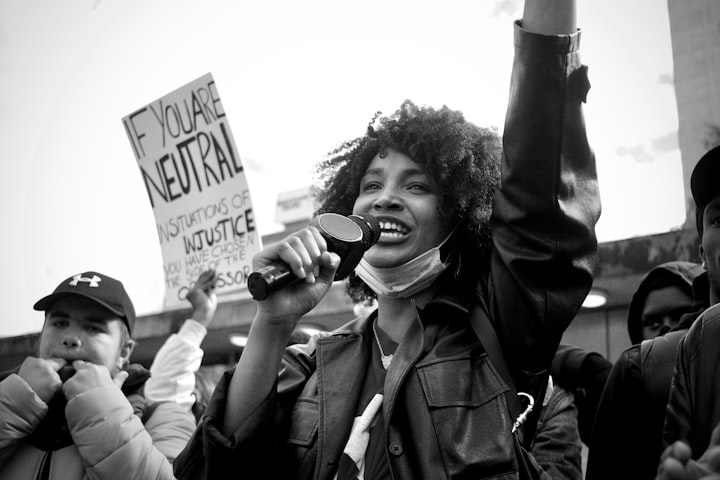"Are We Listening to the Voices of Black Activists in the Black Lives Matter Movement, or Just Paying Lip Service?"
Moving Beyond Hashtags: Real Action to Support the Black Lives Matter Movement.

The Black Lives Matter movement emerged in response to the ongoing violence and systemic racism experienced by Black people in America. Since its inception, the movement has sparked important conversations about race, power, and inequality in our society. However, as the movement has grown in visibility and popularity, questions have arisen about whether or not we are truly listening to the voices of Black activists and organizations who are leading the charge for change. In this essay, we will explore the complexities of the Black Lives Matter movement and consider whether we are truly amplifying the voices and perspectives of Black activists, or if we are simply paying lip service to the cause of racial justice.
The Black Lives Matter movement began in 2013 after the acquittal of George Zimmerman in the shooting death of Trayvon Martin, an unarmed Black teenager. The movement was started by three Black women - Alicia Garza, Patrisse Cullors, and Opal Tometi - as a response to the systemic racism and violence that Black people face in America. The movement's main goal is to combat anti-Black racism and violence, particularly in the criminal justice system.
Over time, the Black Lives Matter movement has grown in size and scope, and has expanded its focus to include other issues affecting Black communities, such as healthcare disparities, economic inequality, and voter suppression. The movement has also become a global phenomenon, with activists in countries around the world organizing and advocating for racial justice.
However, the issues that sparked the Black Lives Matter movement are not new. Black people in America have a long history of experiencing racism, discrimination, and violence at the hands of the state and society. From slavery to Jim Crow laws to modern-day police brutality, Black people have faced a disproportionate amount of harm and trauma in this country.
Police brutality against Black people has been a particularly pressing issue in recent years. High-profile cases like the deaths of Michael Brown, Eric Garner, Philando Castile, and Breonna Taylor have brought national attention to the issue and sparked widespread protests and activism. The Black Lives Matter movement has been at the forefront of these protests, demanding an end to police brutality and advocating for systemic change in the criminal justice system.
The Black Lives Matter movement has its roots in a long history of racism and violence against Black people in America. While its main goal is to combat anti-Black racism and violence in the criminal justice system, the movement has evolved to address a range of issues affecting Black communities. Its impact has been felt both in the United States and around the world, and it continues to be a powerful force for racial justice and social change.
The Black Lives Matter movement has received significant media coverage since its inception, with both mainstream and alternative media outlets reporting on the movement's activities and demands. However, the way that the media has covered the movement has not always been positive or accurate, and this has had a significant impact on public opinion about the movement.
One of the main ways that media coverage has shaped public opinion about the Black Lives Matter movement is through the use of negative framing and stereotypes. For example, some media outlets have portrayed Black Lives Matter activists as violent or dangerous, even when protests have been peaceful. This kind of framing can create fear and suspicion among the public, and can undermine support for the movement's goals.
Another way that media coverage has impacted the Black Lives Matter movement is through the selective use of images and stories. For example, media outlets may focus on isolated incidents of violence or looting during protests, rather than on the larger message and demands of the movement. This can create a distorted picture of what the movement is about, and can distract from the urgent need for systemic change to address anti-Black racism and violence.Despite these challenges, Black Lives Matter activists have also used social media to amplify their voices and spread their message. Platforms like Twitter, Instagram, and Facebook have allowed activists to connect with each other and with a wider audience, and to share information, images, and videos that challenge dominant narratives about the movement.
Social media has also allowed activists to push back against negative media coverage and to control their own narratives. For example, during the protests following the killing of George Floyd, activists used social media to document police brutality and to share stories of their own experiences with racism and violence. These efforts helped to galvanize public support for the movement and to bring attention to the urgent need for change.
Media coverage of the Black Lives Matter movement has had a significant impact on public opinion about the movement, both positive and negative. While some media outlets have used negative framing and selective storytelling to undermine the movement's message, activists have also used social media to amplify their voices and challenge dominant narratives. As the movement continues to evolve, it is important to pay attention to how media coverage shapes public opinion, and to support efforts to promote accurate, fair, and inclusive coverage of the movement.

Since the emergence of the Black Lives Matter movement, there has been a growing trend of mainstream culture and corporate entities co-opting the movement's message and imagery for their own purposes. This co-optation has taken many forms, including the use of Black Lives Matter slogans and hashtags in advertising campaigns, the promotion of Black-owned businesses, and the incorporation of Black Lives Matter symbols and messaging into fashion and entertainment.
While some might argue that this kind of co-optation is a positive development because it brings attention to the movement's message and goals, others have raised concerns that it actually dilutes the movement's impact and detracts from its original purpose. One concern is that mainstream culture and corporate entities may be using the movement's message to boost their own profits and reputations, rather than truly engaging with the underlying issues of systemic racism and violence against Black people.
Another concern is that the co-optation of the Black Lives Matter movement may lead to a watering down of the movement's message and goals. For example, if the movement's slogans and symbols are used primarily for fashion or entertainment purposes, they may lose their original political and social significance, and become just another trend or accessory. This could ultimately undermine the movement's ability to effect meaningful change.
At the same time, some argue that the co-optation of the Black Lives Matter movement by mainstream culture and corporate entities can also be seen as a form of validation and recognition. When major corporations and cultural institutions incorporate the movement's message into their branding and messaging, they are acknowledging the power and significance of the movement, and giving it a wider platform.
The co-optation of the Black Lives Matter movement by mainstream culture and corporate entities is a complex and controversial issue. While it may bring attention to the movement's message and goals, it also raises concerns about the commodification and dilution of the movement's impact. As the movement continues to evolve, it is important to engage in ongoing dialogue about the role of mainstream culture and corporate entities in shaping public opinion and supporting social justice movements.
Black activists and organizations have been at the forefront of the Black Lives Matter movement since its inception. These individuals and groups have been instrumental in raising awareness about the systemic racism and police brutality faced by Black people in America, and in advocating for meaningful social and political change.
However, despite their vital contributions, the voices and perspectives of these Black activists and organizations have often been marginalized or excluded from mainstream conversations about the movement. This marginalization can take many forms, including being omitted from news coverage, excluded from decision-making processes, and facing harassment and intimidation from law enforcement and other authorities.
One reason for this marginalization is the tendency of mainstream media and political institutions to focus on more "palatable" and "respectable" figures and organizations, rather than those that are deemed too radical or confrontational. As a result, the voices and perspectives of Black activists who are seen as too militant or radical may be dismissed or ignored, even though their perspectives may be crucial to understanding the root causes of systemic racism and police brutality.
Another factor contributing to the marginalization of Black activists and organizations is the persistence of structural inequalities and power imbalances within American society. Black individuals and communities continue to face disproportionately high rates of poverty, unemployment, and incarceration, which can limit their ability to access the resources and platforms necessary to make their voices heard.
Despite these challenges, however, many Black activists and organizations continue to do important work in the Black Lives Matter movement, often working tirelessly and at great personal risk to promote social justice and equality. By acknowledging and amplifying their voices and perspectives, we can better understand the complexity and urgency of the issues at stake, and work towards a more just and equitable society.
In light of the systemic racism and police brutality faced by Black people in America, it is essential that we actively listen to the voices of Black activists and support their work, rather than just paying lip service to the cause of racial justice.
This means acknowledging the vital role that Black activists and organizations have played in the Black Lives Matter movement, and actively seeking out and amplifying their voices and perspectives. It means supporting their work through donations, volunteerism, and other forms of activism. And it means holding ourselves and others accountable for working towards a more just and equitable society, where all people, regardless of their race or background, can live with dignity and respect.
As individuals, we can take concrete steps to support Black activists and organizations by educating ourselves on the issues, engaging in dialogue with those who hold different perspectives, and taking action to promote social and political change. We can also demand that our elected officials take concrete steps to address the root causes of systemic racism and police brutality, and ensure that all people, regardless of their race, have equal access to justice and opportunity.
By actively listening to the voices of Black activists and supporting their work, we can help build a society that is more just, more equitable, and more inclusive for all.
About the Creator
Thangaraj Jayagobal
As a writer, I have the power to take my readers on a journey through my unique voice and storytelling abilities. With each word I craft, I capture the essence of the human experience and bring it to life on the page.






Comments
There are no comments for this story
Be the first to respond and start the conversation.